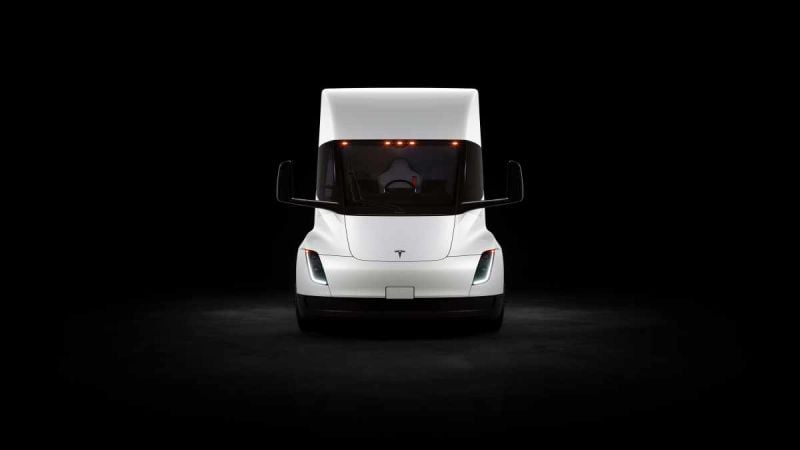Tesla Semi Battery, Drive, and Range
Battery Capacity
The Tesla Semi has a battery capacity of 500 miles * 1.7 kWh which equals about an 850 kWh battery. The 1.7 kWh comes from Elon Musk making a statement on Twitter.
Tesla did a 500 mile range test with its Tesla Semi. It started at 97% and ended with 4%, using 93% of the total battery. 500 miles * 1.7 kWh/0.93 = 914 kWh. It seems the battery capacity is somewhere between 850 kWh and 914 kWh.
500-Mile Drive
When looking at the video of the Tesla Semi driving, it looks like 14.2 seconds were at 60 miles per hour or greater. Regen braking was also minimal. There was a total time of 95 seconds real time at over 60 miles per hour, taking out bathroom breaks. The total time greater than or equal to 60 miles per hour was about 15%. Most of the driving is below 60 miles per hour.
Estimated Range:
We see the best case at 60 miles per hour using about 800 kWh. At 55 miles per hour, this is about 740 kWh and more efficient. A more realistic speed is 52.5 miles per hour.
Aero drag puts the vehicle at about 780 kWh. If the vehicle were to go 70 miles per hour on a drive, that would require 1187 kWh for 500 miles, but could take the semi at about 358 miles of range at 70 miles per hour.
You may also be interested in:
- Tesla Model S Plaid review after 20,000 miles.
- Tesla leaked source code shows cheaper Model Y
- Family of four survives 250 foot fall in Tesla
Tesla Semi Battery Weight, Semi Weight, Load Capacity
Battery Weight
The battery weight of a 2022 Model is about 537 kg. It has a specific Energy of 186 wh/kg. That's a total battery size of 100 kWh.
The Tesla Semi assumes an 850 kWh battery. Divide that by 0.186 wh/kg (using the Model S specs), which gives you, 4570 kg or 10,000 lbs. The battery is about 10,000 lbs. or less.
Semi Weight
A typical class 8 diesel truck weights about 17,000 lbs. There is about 2,100 lbs. of fuel. A Tesla can start at 17,000 lbs. just for the truck. Then add 10,000 for the battery. This is 27,000 lbs. for the truck. Take off 19,000, and you are about -8,000 lbs. compared to a typical diesel.
With laws for EV semi at another 2,000 lbs. and less weight from the drive train and electric motor, you have a load deficit between 4,000 and 6,000 lbs. The total weight of the Tesla Semi seems to be about 27,000 plus tires and other parts, which could put it around 30,000 total miles.
Carrying Capacity
The Tesla Semi has a total cargo weight of about 44,000 lbs. The typical max load is between 40,000 to 54,000 lbs.
How much weight are most diesel trucks hauling around? It looks like the distribution is between about 37,000 to 72,800 for about 80% of diesel trucks. This is within the range that the Tesla Semi could carry.
What do you think of this deep dive into the Tesla Semi? Is it working as advertised by Tesla?
For more information, see this video from Engineering Explained:
In Related News: Electric Vehicle Charging Taking Place on Public Roads
Current efficiency is 1.7kWh/mile, but there is a clear path to 1.6, possibly 1.5
— Elon Musk (@elonmusk) December 2, 2022
Leave your comments below, share the article with friends and tweet it out to your followers.
Jeremy Johnson is a Tesla investor and supporter. He first invested in Tesla in 2017 after years of following Elon Musk and admiring his work ethic and intelligence. Since then, he's become a Tesla bull, covering anything about Tesla he can find, while also dabbling in other electric vehicle companies. Jeremy covers Tesla developments at Torque News. You can follow him on Twitter or LinkedIn to stay in touch and follow his Tesla news coverage on Torque News.
Set Torque News as Preferred Source on Google












Comments
Your fuel weight comparison
Permalink
Your fuel weight comparison contains an error. The primary purpose of a semi is the payload and dollar return so weight is an essential factor. You have quoted a semi with a 250-gallon tank with a range of 1000 miles a conservative calculation. We can therefore reduce the fuel and increase the payload. Next, we only carry that fuel at the start of the journey as the mileage increases the fuel load decreases saving wear and energy. Yes, EV has a place in the distribution of goods but Tesla is failing in my opinion. Other brands are quietly getting on with the job without fanfare. Amazon delivers all packages in Germany with a fleet of electric Mercedes and DHL all local services with a fleet of Ford-based self-made trucks. Long distance is a completely different ball game with a limited number of companies willing to pay a premium for using EVs for green exposure and most others squeeze the industry for every cent.
It seems like your weight
Permalink
It seems like your weight comparison did not account for the electric drive train components weighing less than a diesel engine and transmission.
I see absolutely no reason
Permalink
I see absolutely no reason why an EV semi is allowed to weight more the it's diesel counterpart. Weight is typically determined by the roads and vehicle construction ie tires and suspension.
You cannot subtract the difference of electric motors and diesel drive train to show that ev's are similar in weight. It's simple, take full weight of e-semi and compare it to a similar model diesel and that's the difference. Anything else is a sales pitch and means nothing. So you're at 8-10k lbs difference. If you load both vehicles to the 80-90% max. capacity they say is "typically" hauled and you are still at 8-10k lbs less on the e-semi. Simple math. Yes I'm ignoring the 2k lb bonus given to e-semi because it's not any safer and they shouldn't be given an "bonus". Take the 1k range of a diesel before refueling compared to 500 on the e-semi and its not going to get the load there any faster and would actually require more trips taking more time which will increase cost of product not counting for the cost to by an e-semi. In the city with smaller loads, yeah an e-semi may be beneficial but not on a long haul with heavy loads.
Updated the article and now
Permalink
Updated the article and now have a Grammarly proofreader that will help with mistakes. Thanks for the feedback and I will work to do better.
Everything Musk pushes is "…
Permalink
Everything Musk pushes is " better ,faster,cheaper and far more efficient than anything ". The reality is far different. What is the cost of a 5 ton battery after so many "mega charger " cycles ? I would be very skeptical about the claimed charge rates .
This is certainly not an…
Permalink
This is certainly not an unbiased breakdown. I am not against electric vehicles, but I would like to see truth when pushing the electric technology. For example, compare the actual weight of a class 8 tractor with the electric version. The ACTUAL weight not this add this and subtract that estimation. Secondly, If I want to compare apples to apples I should use a fuel tank size comparable to that of the electric vehicle range. If the electric vehicle is capable of 500 miles on a charge, then I don't need 300 gallons of diesel fuel to go 500 miles. At roughly 6 mpg I would only need about 85 gallons of fuel, which weighs about 600 pounds, not 2100. Do I need to go further? Please give an unbiased comparison and not the sales and marketing version.
I don’t know what kind of…
Permalink
I don’t know what kind of engineer you are, but none if your assumptions make any sense.
If that truck could even remotely carry what diesels can pull, it wouldn’t be hidden from the public.
This truck can barely pull chips to fat kids.
Just once I would like to…
Permalink
Just once I would like to see someone do a real nuts and bolts comparison between the Tesla semi and a diesel semi. Do a calculation of the total cost of goods per pound delivered. Include all costs, (initial cost of the vehicle, maintenance, fuel/ charging costs, insurance) you know the total cost of everything. Remember trucking companies want to deliver the most cargo per the least total cost. Do a 100,000 mile or a number of deliveries per year over the exact same route, like for instance Houston, TX to Seattle, WA.
Thanks
HOW IS THIS "The Most…
Permalink
HOW IS THIS "The Most Unbiased Tesla Semi Breakdown from an Engineer" when the so-called unbiased engineer this is guy "Jeremy Johnson is a Tesla investor and supporter. He first invested in Tesla in 2017 after years of following Elon Musk and admiring his work ethic and intelligence. Since then, he's become a Tesla bull, covering anything about Tesla he can find, while also dabbling in other electric vehicle companies. Jeremy covers Tesla developments at Torque News. You can follow him on Twitter or LinkedIn to stay in touch and follow his Tesla news coverage on Torque News"
there is NO WAY IN HELL your opinion is unbiased the facts don't add up your figures are skewed in favor of the tesla truck what a CLOWN SHOW can we get some ACTUAL FACTS up in this b....